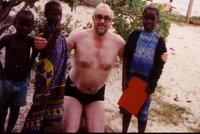
"You must excuse him, he's a limey"
"You know, Jake, for a pom, you're not too bad"
"You're a typical bloody scouser, Jake!"
So, that's me pigeonholed: a limey, a pom, a scouser. The people who said those things to me are people without an ounce of prejudice in their veins as far as I know, people whom I respect and like enormously.
For those of you not familiar with these terms, a limey is an American term for a Brit, used in this case by my Californian friend, Don H; a pom is the term used by Australians, in this case by friends I made in Perth, Don and Paula; and scouser is the popular name for someone from Liverpool (scouse is a local dish made from vegetables and whatever meat you can find), something I have been called many times (erroneously; I am a Shropshire Lad) .
I am all these things and more: in my time, I have also been a mzungu (Swahili), a farang (Thai) and a gaijin (Japanese).
Now, before you fall asleep, I will tell you my mzungu story. North of Dar-es-Salaam is a company guest house where I stayed during an assignment in Tanzania. It is in a security compound, surrounded by a high fence and patrolled by armed soldiers. In the grounds the houseboy Juma (he was about 40) and his family also live. Outside the fence there is a beautiful beach, to which lots of expats - mainly Swedes and Danes - come with their families at the weekend to swim and sunbathe. Juma's children peer through the wire at these strange pale apparitions, these "wazungu" (plural of mzungu, which means a European), and then go back to their games under the banyan. One Sunday morning, I was sitting on the verandah of the guest house, dressed lightly to cope with the heat and humidity of the Swahili coast. Giggles. Whispers. Childish noises which mean "Go on, I dare you!" in any language.
Juma's three children appear before me: the eldest, Suda, a girl of, well, she looks about eight but turns out to be thirteen, a younger girl of about seven, and a boy who is just a stripling. They come closer and closer to me, and finally look curiously at the book I have on my lap, a book which blessedly has many pictures of animals. So we start to play the language game Me: "Ki-ingilezi LION", Suda: "Kiswahili SIMBA" and so on, me repeating the Swahili and they the English (I cannot remember any more now, except for TWIGA - giraffe - which was the adopted name of the company I was working with; and, of course, NDEGE, given my passion for birds).
And then, one of those moments you never forget: Suda, being the eldest and boldest, suddenly touched my arm briefly and then withdrew her hand as if scolded. I waited. She did it again, this time running her fingertips over the skin. Then the other two, emboldened, did the same. I held my breath. In no time, they were exploring me avidly, my hair in particular being a source of great fascination. I realised at that moment what was going on:
All their lives they had watched the wazungu through the compound fence, but this was the first time they had ever touched the strange pale flesh and the wispy hair. In this case, the hair made more fascinating by being white (That made me a Mzee, but that's another story for another day)
If I knew what an epiphany was, I would call this an epiphanic moment. Hell, I'll call it that anyway. Stunning, mind-expanding, revealing.
I am glad that I was the mzungu who gave them the chance to find out that, in essentials, my skin was the same as theirs, just a different pigment. Partly because - and they couldn't know this - it was the first time I had ever, in my turn, touched African skin or African hair. It's just skin and hair, guys. Felt nice. Different, but nice, just as mzungu skin and hair was to them, I guess.
Just hair, just skin, just people.
No comments:
Post a Comment